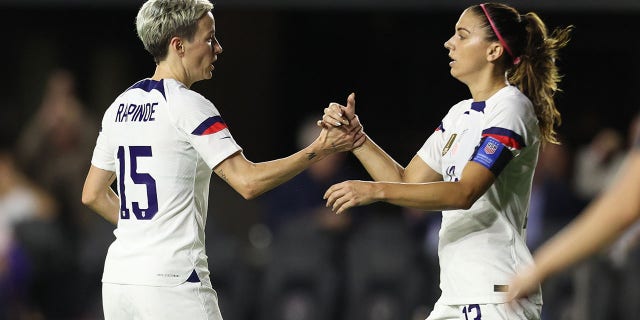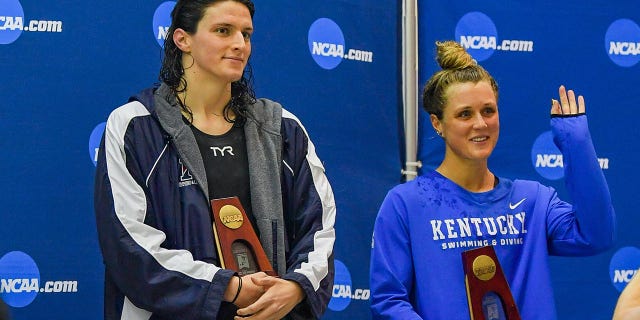Former NCAA swimmer Riley Gaines made it clear how she feels about U.S. Women’s National Team players Megan Rapinoe and Alex Morgan defending the inclusion of transgender athletes in women’s sports.
“It’s disingenuous and it’s virtue signaling. They want to be seen as kind. They want to be seen as inclusive, but they know in their hearts, every single person knows they wouldn’t have had the opportunities and the success they had without the women’s sport and category,” Gaines said Thursday.
“Now they’ve achieved what they’ve achieved. They’ve accomplished what they wanted to accomplish, so they don’t care,” she continued. “They would rather give girls up, give away our opportunities to be seen as kind and inclusive when in reality this isn’t inclusive, it’s exclusive.”

The soccer powerhouses have both expressed support for including transgender athletes in women’s sports.
In April, Rapinoe was one of 40 professional, Olympic and paralympic athletes to co-sign a letter to House lawmakers in opposition to the Protection of Girls and Women in Sports Act.
Last June in honor of the anniversary of Title IX, Rapinoe offered her take on the backlash towards transgender athletes in women’s sports.
“I would also encourage everyone out there who is afraid someone’s going to have an unfair advantage over their kid to really take a step back and think what are we actually talking about here. We’re talking about people’s lives. I’m sorry, your kid’s high school volleyball team just isn’t that important. It’s not more important than any one kid’s life,” Rapinoe told TIME.
Before the SheBelieves Cup earlier this year, she revealed that she and her teammates are not going to “shy away” from hard conversations or “taking a stand for what’s right.” Her comments come after Becky Sauerbrunn wrote an op-ed in support of trans kids in sports.
“Playing in Florida and Texas, that’s something that the team definitely needs to look at,” she said of bills in state legislature that restrict transgender girls from playing against biological girls.
“The inclusion of trans kids in sports is the inclusion of kids in sports. Everyone should have the ability to play sport. And the fact that it’s being taken into politics so big is really sad. And I think it’s at the cost of trans kids’ lives. It’s really sad, and I feel like what Becky said was great. And for this team, we’ve always been very vocal with where we stand and I think we’ll continue to do that.”
Both Morgan and Rapinoe will join the roster of 23 athletes set to represent the U.S. at the 2023 Women’s World Cup next month. Morgan, 33, and Rapinoe, 37, will each make their fourth World Cup appearance.

Gaines, who has been a staunch defender of women’s sports, made her comments against the soccer stars a day after she delivered an emotional opening statement to start the Senate hearing on “Protecting Pride: Defending the Civil Rights of LGBTQ+ Americans.”
Gaines opened her testimony by recalling how she and transgender female Lia Thomas, who competed for the University of Pennsylvania, tied for fifth place in the 200-yard NCAA freestyle championship and how she and her team watched Thomas win the 500-yard freestyle the day before.
The former Kentucky star, a 12-time All-American, said the NCAA opted to give Thomas the trophy and the photo-op.
She then got emotional when talking about being forced to share a locker room with Thomas.
“Actually the rationale behind the arrangement, I walked out of the locker room and I asked one of the officials on the pool deck. I said, what are the guidelines that allowed this man into our locker room? And so nonchalantly he said back, ‘Oh, well, we actually got around this by making locker rooms unisex,’” Gaines explained further on Thursday.
“So I’m thinking to myself in these moments of him saying this, first and foremost, he just admitted this is a man by acknowledging how he had to change the rules to allow him into our locker rooms and secondly, unisex. So any man could have walked into that locker room, any coach, any official, any parent, any pervert who wanted to walk into the locker room would have had full access to – and bare minimum, we weren’t even told this was the arrangement, that that is what they were doing. That is how they were trying to normalize the situation and make us feel guilty when we felt uncomfortable.”
Gaines warned that what she experienced is becoming more widespread across the nation as parents, coaches and players struggle to find a voice to defend biological female athletes.
“To believe it’s a non-issue or to believe it’s only happening in a certain area could not be further from the truth,” she said. “It’s plaguing this country, and it’s bigger than just the fairness piece. It is about the freedom of speech piece. That’s why it seems as if I’ve been this lone voice fighting for this until recently, when some amazing girls have stood by my side. But I am the megaphone for so many who are terrified.”

